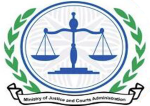The Supreme Court
The Supreme Court is established as a superior Court of record under Article 65 of the Constitution of Samoa consisting of the Chief Justice, who is appointed by the Head of State on the advice of the Prime Minister and other Judges of the Supreme Court appointed by the Head of State acting on the advice of the Judicial Service Commission. With the exception of Part IX of the Constitution, which relates to the Land and Titles Court and laws administered thereunder, the Supreme Court:
- Has original, appellate and revisional jurisdiction and possesses and exercises the jurisdiction, power and authority necessary to administer the laws of Samoa;
- Has jurisdiction to hear and determine any question arising in any proceedings before another Court (other than the Court of Appeal) as to the interpretation or effect of any provision of the Constitution;
- Has jurisdiction and necessary powers to make all such orders necessary and appropriate to enforce fundamental rights conferred under Part II of the Constitution;
- Has jurisdiction to hear and determine appeals from decisions of the District Court or any of its Divisions. A decision of the Supreme Court on an appeal from a lower Court is final unless leave to appeal to the Court of Appeal is given.
Criminal Jurisdiction
Section 4 of the Criminal Procedure Act 2016 sets out the criminal jurisdiction of the Supreme Court. This includes the jurisdiction to hear and determine:
- Criminal proceedings commenced in the Supreme Court by the laying of an information or which are transferred to the Supreme Court from the District Court for trial under the CPA 2016 or any other Act.
- Criminal appeals from the District Court or a Division of the District Court;
- All applications for release on bail or at large in respect of any information laid in or transferred to the Supreme Court;
Generally, the Supreme Court hears and determines criminal proceedings relating to offences with a maximum penalty exceeding 7 years’ imprisonment. Trials in the Supreme Court are tried before a Judge sitting alone or, where the defendant is charged with an offence punishable by life imprisonment, by a Judge sitting with assessors. Defendants may however apply to be tried before a Judge alone.
Civil Jurisdiction
Civil proceedings in the Supreme Court commence by way of action or motion. Proceedings for the recovery of debt or damages; recovery of land or chattels, or for an order for specific performance are commenced by way of action. All other civil proceedings, such as judicial review proceedings and applications for declaratory orders, are instigated by way of motion.
The Supreme Court may hear and determine any action where the debt, demand, damage or value of the chattels claimed is more than ST$20,000.00.
